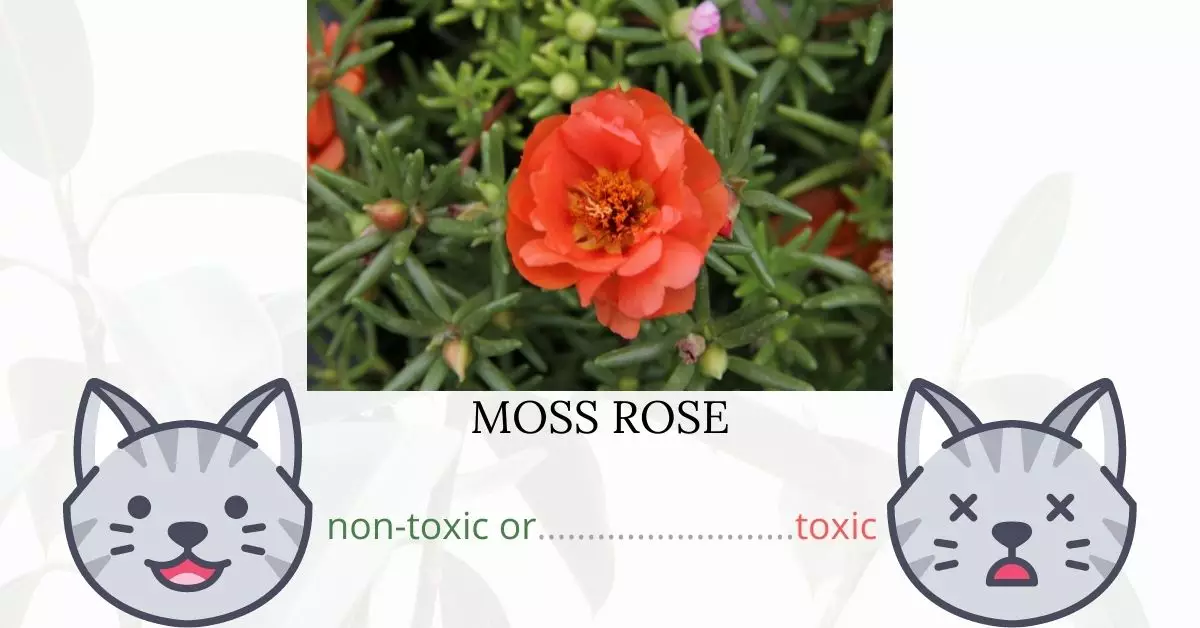Moss Rose, commonly known as Portulaca, is indeed toxic to cats.
This article is crafted in collaboration with a team of experienced DVMs (doctors of veterinary medicine). Through their extensive knowledge and our combined research on high-authority websites such as ASPCA and PetMD, we aim to provide accurate and up-to-date information regarding the potential risks associated with Moss Rose and its effects on feline friends.
The plant contains soluble calcium oxalates, primarily concentrated in its leaves, which are harmful to cats. Ingesting even small amounts can result in severe symptoms and potentially lead to renal failure. While it’s rare for cats to consume significant quantities of Moss Rose due to the rapid onset of these symptoms, it is imperative to seek medical assistance immediately if you suspect your cat has ingested any part of the plant.
Clinical Signs of Moss Rose or Portulaca Poisoning in Cats

When a cat comes into contact with, inhales the scent of, or ingests the Moss Rose plant, it may exhibit a range of symptoms due to the soluble calcium oxalates present in the plant. These calcium oxalates can interfere with the cat’s system, leading to the following clinical signs:
- Weakness: This is a direct result of the body’s response to the toxin, reducing the cat’s muscle coordination and energy levels.
- Lethargy: Oxalates can affect the metabolic processes and overall alertness of the cat, causing a noticeable decrease in activity.
- Excessive Drooling: The immediate irritation to the oral mucous membranes by the oxalates can cause an increase in saliva production.
- Appetite Loss: The discomfort and nausea caused by the toxins can lead to a diminished desire to eat.
- Vomiting: As the body’s way of trying to rid itself of the ingested toxins, vomiting can ensue shortly after consumption.
- Diarrhea: The gastrointestinal system reacts adversely to the oxalates, leading to digestive disturbances like diarrhea.
- Tremors: These may arise due to the interference of calcium oxalates with the cat’s neuromuscular functions.
- Damage to the Kidneys: Over time, and especially in high doses, the soluble calcium oxalates can lead to kidney damage. This is especially concerning for cats with pre-existing renal issues, as they are more vulnerable to the adverse effects of the plant.
The severity of these symptoms can vary based on the quantity of Moss Rose consumed and the overall health of the cat. Cats with pre-existing renal conditions are at an increased risk. It’s essential to note that these symptoms usually manifest within two hours post-ingestion and, in extreme cases, can be fatal. If any of these symptoms are observed, immediate veterinary care is crucial.
First Aid and Treatment of Moss Rose or Portulaca Poisoning in Cats

The common procedures used to treat mild cases of moss rose poisoning may involve inducing vomiting, commencing intravenous fluid therapy, using activated charcoal to remove toxins in the cat’s stomach, and giving medicines to reduce recurrent vomiting are some of the treatment options of the veterinarian. Other medications and procedures may also be administered depending on the cat’s symptoms.
Recovery from Moss Rose or Portulaca Poisoning in Cats

The prognosis for a cat’s recovery depends on how quickly the poisoning was discovered and treated after ingestion, as well as whether or not kidney failure developed. Mild cases of moss rose poisoning that are treated immediately and effectively usually go away within 24 hours. In case of kidney damage, the veterinarian may require follow-up visits to the clinic to check the cat regularly.
Prevention of Moss Rose or Portulaca Poisoning in Cats
Poisoning can only be avoided by not planting toxic plants in your house or yard. Limiting your cat’s access outdoors can also lessen the possibility of wandering outside and encountering a moss rose or other poisonous plants. Cat owners should do their research before bringing any plants home.
If you love plants but have cats at home, check out these lists:





